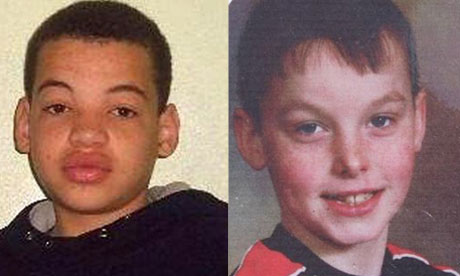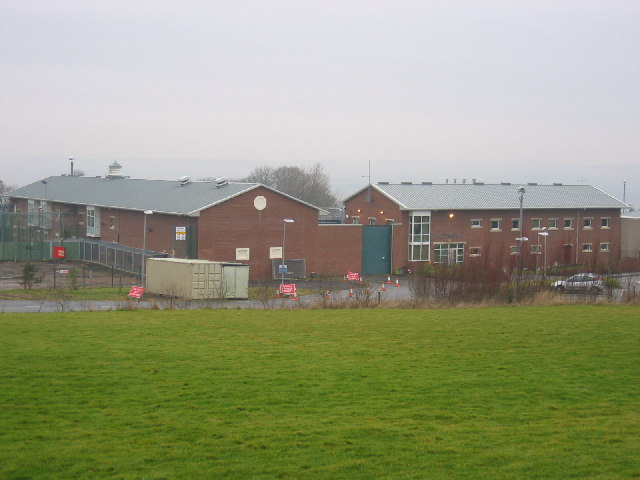English youth face torture in private prisons
Posted by Jack in Uncategorized, tags: prisons
Gareth Myatt and Adam Rickwood, who both died in custody in 2004
After a five year battle, campaigners in England have managed to uncover a shocking manual demonstrating that serious physical abuse of vulnerable young people is officially sanctioned in privately run detention centres for young people.
Secure Training Centres (STCs) are units designed to house young (17 and under) offenders who have been sentenced to custody or in remand. So even if they are not formally called that, they are prisons. There aren’t any in Scotland, but the ones down south are all run by private companies.
The staff manual on ‘Physical Control on Care’ has been kept classified by the Youth Justice Board, which oversees the centres. Activists have been battling for years to get it released under Freedom of Information laws, and have previously given copies with large sections blacked out. Finally, courts have ordered the document to be released, and what it shows is outrageous violence is part of the official regime in STCs.
Some of the measures the manual deems acceptable include:
-”Use an inverted knuckle into the trainee’s sternum and drive inward and upward.”
-”Continue to carry alternate elbow strikes to the young person’s ribs until a release is achieved.”
-”Drive straight fingers into the young person’s face, and then quickly drive the straightened fingers of the same hand downwards into the young person’s groin area.”
-Forcing children to “adopt a kneeling position” while steel handcuffs are put on them.
-Grab the neck and chin to “take control of the head.”
In other words, employees of private companies, with the government’s blessing are taught to deliberately hurt young people who the state has locked up. This is just what is officially legitimised – legal rulings have found other common practices in STCs to be unlawful, such as “nose distraction”: hitting someone hard on the nose.
If it’s not acceptable for a teacher to physically abuse children, why is it ok for them?
The instructions are not just for the self-defence of STC workers, but also aimed at guaranteeing compliance with “reasonable requests or direct orders.” STCs are for youth who are deemed too vulnerable to go into mainstream young offender’s institutions. In STCs, the regime is supposedly aimed at rehabilitating young offenders, providing them with intensive education “25 hours a week, 52 weeks a year.”
In reality most of the people who find themselves in STCs are likely to have come from extremely difficult backgrounds, and will have suffered abuse, personal and social problems, and are likely to have difficulty engaging with formal education. But they are unlikely to find any sympathy or support in an STC, for-profit hell holes where private companies make money from locking up children. The abuse they suffer at the hands of staff will ensure for many a life spent in and out of prison, filled with rage, misery and despair.
The Children’s Rights Alliance for England, has been fighting to get hold of the documents since the deaths in custody of two different teenagers in 2004. Gareth Myatt, 15, was held down was held down by three staff in Rainsbrook STC in Warwickshire. He choked on his own vomit and died. Adam Rickwood hanged himself at Hassockfield STC in County Durham. Last year a judge ruled that shortly before his death unlawful force had been used to restrain him.

Hassockfield STC, where Adam Rickwood died
While we shouldn’t pretend that there isn’t also a brutal regime in state young offenders’ institutions (where some techniques now banned in STCs, such as using pain as a “distraction”, are still permitted), it’s particularly disturbing that this abuse is going on in privatised, profit making prisons run by companies like SERCO and G4S. These companies are making pain and misery their business; SERCO also runs the Yarl’s Wood Immigration Detention Centre, where earlier this year detainees went on hunger strike to protest their brutal and humiliating treatment.
What this underlines is the importance of fighting privatised prisons every step of the way. In the US the prison industry is a huge business, and underpins the whole economy of many rural areas. Under these conditions, the criminal justice system becomes nothing more than a supplier of these businesses’ main natural resource: young prisoners, who can then also be used as free labour, or modern day slaves. It would be a good idea if we could find out if any major meetings or offices exist for some of these companies in Scotland, and make it our business to disrupt their profit making from abuse.
These guidelines were formulated under a Labour government, and now the ConDems are just as willing to defend them. Until this month, the government was prepared to go all the way to fight the release of the manual in court, but finally caved and released it. The Ministry of Justice has since defended its contents, saying “staff need to be able to intervene effectively, to protect the safety of all involved.”

SERCO: Scumbags
The way vulnerable youth are treated by the criminal justice system in the UK is horrifying, and will only contribute to the growth of violence, mental illness and misery throughout our society. It might be shocking to realise that this kind of abuse doesn’t take place in Guantanamo Bay, but to people we could have gone to school with or grown up alongside, right under our noses. The next time you hear some right wing politician or media wank talking about the need to crack down on youth offenders, or use tough love (surely one of the most disgusting euphemisms for abuse in this context), remember what it’s really like in one of these places. It’s time we realised that locking up young people rarely solves any of the complex social problems created by capitalism, and when those incarcerated face violence and abuse it only guarantees that the pain and humiliation will have consequences for the rest of the victims’ lives, and the lives of those around them.
If you’re reading this and you’re worried because you think someone is suffering or is at risk, the best advice is to contact local children’s services and the NSPCC.
 Entries (RSS)
Entries (RSS)
Children 1st are a more established Scottish Children’s charity, and actually objected to the NSPCC starting to raise funds in Scotland. I THINK (not sure) that Children 1st actually have more of a face to face presence in Scotland, and they only work here.